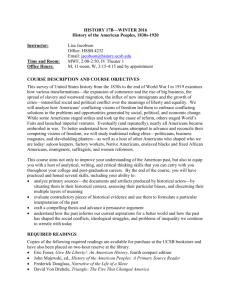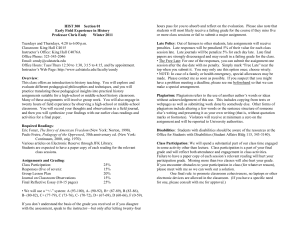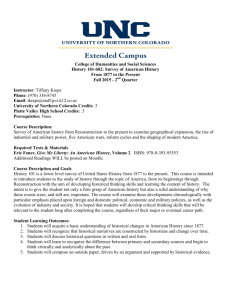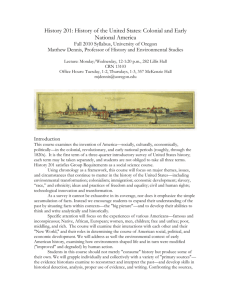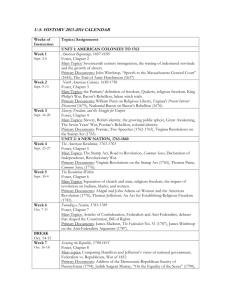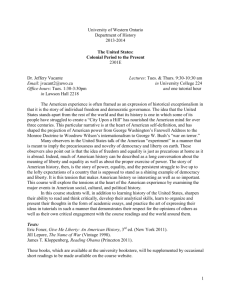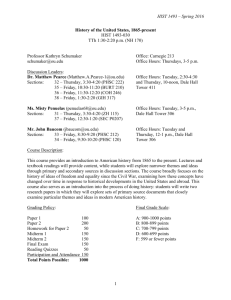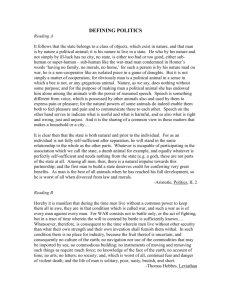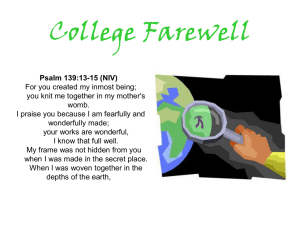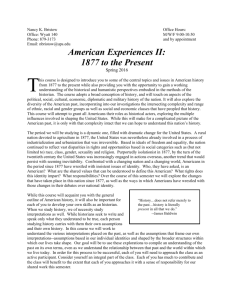Preliminary Topics and Lectures - History-17b
advertisement
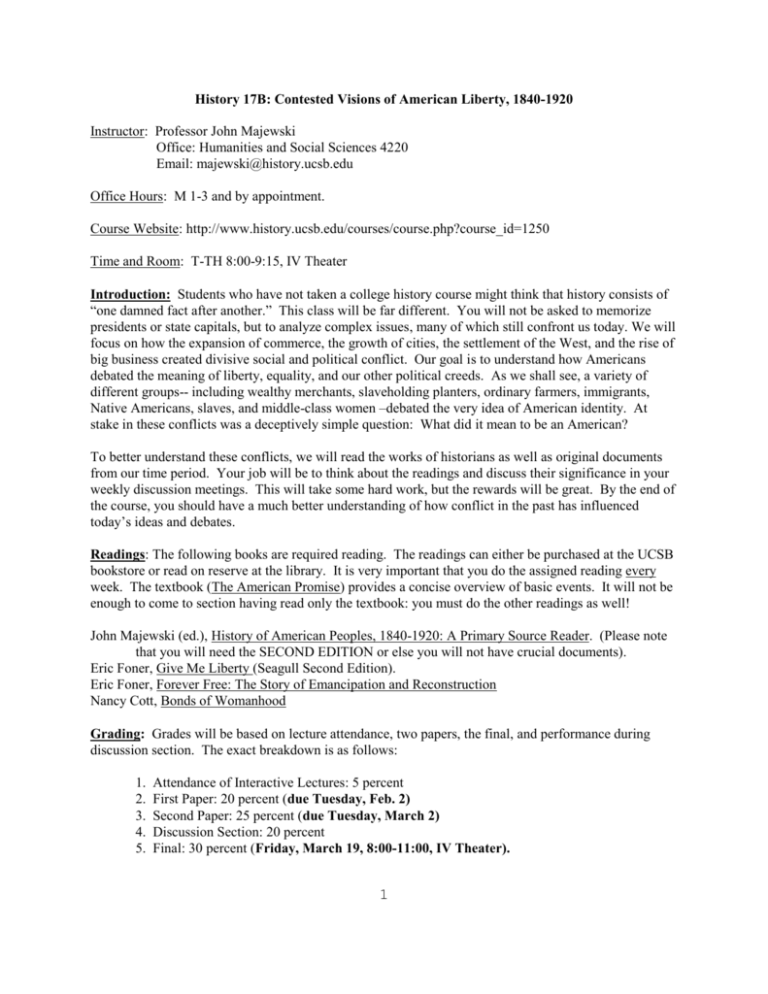
History 17B: Contested Visions of American Liberty, 1840-1920 Instructor: Professor John Majewski Office: Humanities and Social Sciences 4220 Email: majewski@history.ucsb.edu Office Hours: M 1-3 and by appointment. Course Website: http://www.history.ucsb.edu/courses/course.php?course_id=1250 Time and Room: T-TH 8:00-9:15, IV Theater Introduction: Students who have not taken a college history course might think that history consists of “one damned fact after another.” This class will be far different. You will not be asked to memorize presidents or state capitals, but to analyze complex issues, many of which still confront us today. We will focus on how the expansion of commerce, the growth of cities, the settlement of the West, and the rise of big business created divisive social and political conflict. Our goal is to understand how Americans debated the meaning of liberty, equality, and our other political creeds. As we shall see, a variety of different groups-- including wealthy merchants, slaveholding planters, ordinary farmers, immigrants, Native Americans, slaves, and middle-class women –debated the very idea of American identity. At stake in these conflicts was a deceptively simple question: What did it mean to be an American? To better understand these conflicts, we will read the works of historians as well as original documents from our time period. Your job will be to think about the readings and discuss their significance in your weekly discussion meetings. This will take some hard work, but the rewards will be great. By the end of the course, you should have a much better understanding of how conflict in the past has influenced today’s ideas and debates. Readings: The following books are required reading. The readings can either be purchased at the UCSB bookstore or read on reserve at the library. It is very important that you do the assigned reading every week. The textbook (The American Promise) provides a concise overview of basic events. It will not be enough to come to section having read only the textbook: you must do the other readings as well! John Majewski (ed.), History of American Peoples, 1840-1920: A Primary Source Reader. (Please note that you will need the SECOND EDITION or else you will not have crucial documents). Eric Foner, Give Me Liberty (Seagull Second Edition). Eric Foner, Forever Free: The Story of Emancipation and Reconstruction Nancy Cott, Bonds of Womanhood Grading: Grades will be based on lecture attendance, two papers, the final, and performance during discussion section. The exact breakdown is as follows: 1. 2. 3. 4. 5. Attendance of Interactive Lectures: 5 percent First Paper: 20 percent (due Tuesday, Feb. 2) Second Paper: 25 percent (due Tuesday, March 2) Discussion Section: 20 percent Final: 30 percent (Friday, March 19, 8:00-11:00, IV Theater). 1 The papers will cover topics that will give you the chance to apply the primary source readings in constructing your own arguments. Your TA will give you more information—including format instructions and writing advice—as the quarter progresses. The final will consist solely of essay questions which will be given out in advance. To reward students who consistently come to lecture, we will be using the “i-clicker” system. Your eclickers can be purchased at the bookstore, either with the textbook or separately. ALWAYS BRING YOUR i-CLICKER TO CLASS. After week one, all lectures will be an interactive lecture in which you can receive credit simply by showing up. Students are expected to attend 10 lectures. A student attending 10 lectures will receive an A+ for their lecture attendance grade; a student attending none of the interactive lectures will receive a zero. You can significantly improve your grade simply by showing up! All grading will be done by your TA. If you disagree with your TA over a grade, you may appeal to me only after discussing the issue first with your TA. Every appeal to me must be in writing specifying exactly why you believe your grade should be raised. I reserve the right to lower as well as raise grades in appeal situations. All appeals must be initiated within one week after an assignment has been returned to students. Please be advised that plagiarism or any other form of cheating will not be tolerated in 17b. Any student caught turning in work other than their own will receive an automatic “F” in the course and disciplinary action from the University. . Students must earn a passing grade in section to pass the course. You should keep in mind that three unexcused absences will result in an automatic “F” in section. SPECIAL NOTE: This is a large class, so please do not talk, read newspapers, or engage in other distracting behaviors. If students repeatedly act in a rude and distracting manner—including leaving early without prior authorization— I will ask the TAs to take their names so that their grades may be penalized accordingly. Please turn off your cell phones as you enter class. 2 Schedule of Weekly Lectures Topics and Readings Part I: A Fractured Republic I. American Society in 1840 Jan. 5: Introduction to History 17B Jan. 7: America in 1840: Economy, Society, and Politics Reading: Foner, Give Me Liberty, 302-371 Majewski, History of the American Peoples, 3-8 II. Domestic Ideology and Moral Reform Jan. 12: Separate Spheres, Middle-Class Women, and Reform Jan. 14: From Reform to the Early Women’s Rights Movement Reading: Cott, Bonds of Womanhood, 1-125, 197-206 Foner, Give Me Liberty, 411-440 Majewski, History of the American Peoples, 9-25 III. Was the South Exceptional? Slavery and the Southern Society Jan. 19: An Empire for Liberty? Slavery, Native Americans, and Western Expansion Jan. 21: Slave Culture, Slave Resistance, and Pro-Slavery Ideology Reading: Majewski, History of the American Peoples, 29-36 Foner, Give Me Liberty, 375-408 IV. Why did Northerners Oppose the Expansion of Slavery? Jan. 26: “Mexico Will Poison Us:” The Slave Power and Free-Labor Ideology Jan. 30: The Tumultuous Politics of the 1850s Reading: Majewski, History of the American Peoples, 37-60 Foner, Forever Free, 3-40 Foner, Give Me Liberty, 441-479 V. Why Did the South Lose the War? Feb. 2: The Civil War as Total War (Paper #1 Due) Feb. 4: Did the Slaves Free Themselves? Reading: Majewski, History of the American Peoples, 61-85. Foner, Forever Free, 41-75 Foner, Give Me Liberty, 480-519 3 VI. Race and Government after the Civil War Feb. 9: Reconstruction and the Fight for Civil Rights Feb. 11: Non-Classroom Instruction (Native Americans and the Gilded Age West) Reading: Majewski, History of the American Peoples, 85-90, 121-138. Foner, Forever Free, 76-201 Foner, Give Me Liberty, 568-579 Part II: Political Responses to the Rise of Big Business VII. The Rise of Big Business Feb. 18: Debating Big Business Feb. 20: Responding to Big Business: Unions and Populists Reading: Majewski, History of the American Peoples, 93-120. Foner, Give Me Liberty, 556-568, 584-608 VIII. The Middle Class Responds to Big Business: Making Sense of the Progressives Feb. 23: Debating the Meaning of Progressivism Feb. 25: A New Vision of America and the World: Progressivism and Imperialism Reading: Majewski, History of the American Peoples, 141-170 Foner, Give Me Liberty, 624-677 IX. Race and Culture in the Progressive Period March 2: Racism, Lynching, and the Progressives (Paper #2 Due) March 4: Masculinity and the New Culture of Sports Reading: Majewski, History of American Peoples, 171-92 Foner, Give Me Liberty, 608-616 Foner, Forever Free, 202-238 X. A Different Kind of Political Power: The Suffrage Movement in the Progressive Period March 9: The Suffrage Movement and World War I March 11: Non-classroom instructional day Reading: Majewski, History of the American Peoples, 193-209 Foner, Give Me Liberty, 678-718 4
